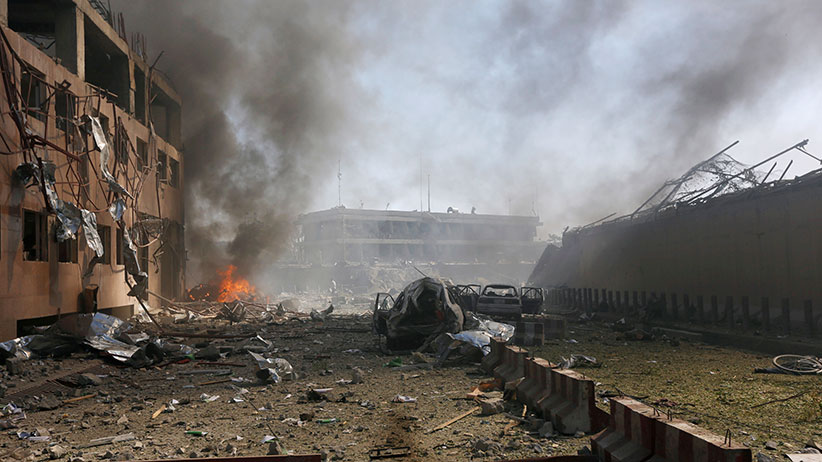How badly has Canada failed Afghanistan?
The massive bombing in Kabul underscores how far the country has fallen as security has collapsed and foreign aid evaporated
Damaged cars are seen after a blast in Kabul, Afghanistan May 31, 2017. (Omar Sobhani/Reuters)
Share

For the first time since 2006, Canada’s diplomats were reminded just how precarious their position is in Afghanistan. In January of that year, Glyn Berry, a veteran foreign affairs official, was killed after a Canadian military convoy was hit by a suicide bomber in Kandahar province.
The Canadians then had only just begun their combat mission into the heart of the Afghan war after agreeing to assume security control of Kandahar. His death was a tragic outcome of the Sisyphean challenge Canada had taken on.
But the May 31 truck bombing in one of the Afghan capital’s most heavily guarded districts—a one-square-kilometre area packed with more than a dozen embassies, including Canada’s, the headquarters of the Afghan national intelligence directorate, the foreign ministry, and the presidential palace—says infinitely more about where Afghanistan stands today.
Berry’s death was in some ways prophetic: it reminded Canada that Kandahar would be like nothing else our military had encountered. Yesterday’s attack is a reminder that everything Canada sacrificed during that costly deployment may have come to naught.
The Taliban controls more of Afghanistan today than at any other time since its regime was toppled at the end of 2001. The so-called Islamic State has made inroads into the country while criminal gangs rule the streets in most cities. Kidnapping for ransom has become so widespread that foreigners in the capital have been reduced to prisoners in their own homes and workplaces, rarely if ever experiencing the joy of meeting Afghans at marketplaces and teashops. Blast walls have gone higher, doors have become thicker and most compounds now come with safe rooms pre-installed.
Those precautions likely saved the lives of foreigners when a sewage tanker packed with a reported one tonne of explosives detonated a mere 400 metres from the Canadian embassy, on the doorstep of the German diplomatic mission and in the middle of the morning rush hour. Nearly 100 people, all Afghans, died, while over 400 more were injured. The force of the blast carved out a four-metre-deep crater, shook homes five kilometres away and badly damaged the main building on the German grounds, despite the 3-metre high blast walls surrounding it.
The Canadian embassy sustained “significant damage,” Foreign Affairs Minister Chrystia Freeland said in a statement, though no one was reportedly injured.
No one has taken responsibility for the bombing, though Afghanistan’s intelligence services were quick to lay the blame on the Haqqani network and their backers in Pakistan. The Taliban, which claims to speak for the Haqqanis, denied they were involved, as they often do when attacks attributed to them result in high civilian casualties. Most experts agree ISIS does not possess the capabilities in Afghanistan to mount such a sophisticated operation. Their networks are limited to the east of the country bordering Pakistan.
But the lingering questions over who carried out the attack mask a more pressing issue: regardless of the culprit, someone was able to drive a truck bomb undetected into one of Kabul’s most important districts. Questions are now being raised over how that could happen.
“The investigation is looking at weaknesses in the security procedures,” an interior ministry official told Maclean’s, on condition of anonymity. “There are some early indications that the attackers may have received help from elements inside the security forces.”
Taliban and ISIS militants lurking inside Afghanistan’s police and army has become a serious problem for Afghan authorities. But the rot, according to security experts, runs much deeper. As the foreign presence in Afghanistan has dwindled, foreign aid has slowed to a trickle. Thousands of Afghans who once made a decent living working for what used to be the world’s largest development operation now find themselves out of work and desperate.
Corruption is rampant, an enemy “just as insidious” as the Taliban and ISIS, Kenneth Neufeld, Canada’s Ambassador to Afghanistan, told Maclean’s last April. Part of Canada’s commitment to Afghanistan—$450 million over the next three years—is intended to tackle the problem, he added, with half the money earmarked for security, including paying the salaries of security personnel.
It’s a start, but according to UN figures, falls well short of what is needed. Afghan police officers remain some of the most underpaid and badly trained in the world. Their literacy rate is stuck at a dismal 20 per cent, and officers can still be found moonlighting as taxi drivers and labourers.
The Taliban, and now increasingly ISIS affiliates, are comparatively flush with cash, offering in some cases upwards of $950 a month to new recruits, according to locals in Taliban-controlled areas.
The Afghan government simply cannot compete. It finds itself caught in a feedback loop in which increasing insecurity is leading to more donor flight leading to more insecurity. Foreigners have all but disappeared from public view, leaving Afghans exposed to attacks while requests for NATO countries to offer more troops have fallen on deaf ears.
Wednesday’s bombing was a macabre clarion call: Afghanistan is facing its worst summer of discontent since the international community intervened to free Afghans from the oppressive Taliban regime more than 15 years ago. If we are not willing to do more to stabilize the country, we are dooming Afghanistan to an even worse fate.